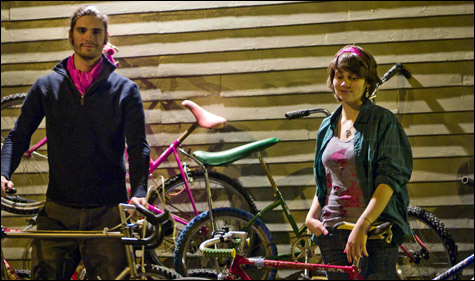
PEDAL POWER Phipps and McGarrity. |
You won't be able to miss them. Just look for the bright-pink flamingos — or the matching pink sheaths on the bikes. For the past few months, they've been stationed at 15 West, Rhode Island School of Design's downtown dorm and library building, but starting Monday, they'll be on other campus sites as well.Pink Rides Providence, a bike-sharing program born out of two RISD juniors' desire to share the joys of cycling with their fellow students, is scaling up.
Started last November as a pilot with two bikes, Pink Rides is expanding to as many as 20 bikes, though still just for RISD students. The next step, says co-creator Nathan Phipps, an industrial design student, will likely be to connect with other colleges, especially Brown University.
But the ultimate goal is to put flamingos — and communal bikes — all over the city, providing free, convenient, and environmentally-friendly transportation to anyone who wants it.
"That's still pretty far out in terms of planning and everything," says Phipps. "But we have some ideas about how it might work, and the city is interested in having a bike-sharing program."
In fact, quite a few people have gotten interested: from fellow cycling enthusiasts to entrepreneurial and creative types who see this as a promising model for Providence and all of Rhode Island.
Earlier this month, Phipps and his partner, Madeleine McGarrity, presented their vision to a packed room at the first "Pecha Kucha Providence," a showcase of innovative ideas held at Local 121. And Seed Providence, an initiative to promote collaboration and investment in sustainability, is actively supporting Pink Rides.
Wayne Franklin, whose firm Urban Sun Investments Inc. launched Seed Providence, had been talking about a possible bike-sharing program downtown when a RISD professor told him about Pink Rides. He contacted Phipps to offer his help and learn about the pilot.
"I said, 'How can we leverage what you have . . . to bring it downtown, and how can I use my skills and my connections to make that happen?' " he recalls. "I'm really just trying to bring what [Phipps] has to a bigger level."
The pilot was done on a shoestring — just about $50 out of pocket, Phipps says. RISD's public safety office donated the bicycles, from a stash of bikes abandoned on campus. And Legend Bicycle, in Fox Point, donated two good locks (cheap ones, after all, would make this a short-lived project).
To avoid the high cost of automated systems, Phipps says, they went low-tech, relying on RISD public safety officers posted at the dorm to watch the bikes. They issued no membership cards — just show a student ID and provide an e-mail address and a phone number to get a bike for up to six hours.
Phipps says he'd expected the bikes to be used for errands or to get to specific places, but surveys showed the rides were mostly recreational. But the bikes were out almost every day (or, well, one was; the other was wrecked by a car over winter break). Clearly the interest was there.
For the RISD-wide expansion, Phipps and McGarrity got more abandoned bikes from the public safety office and another donor provided locks. Recycle-a-Bike, a collective based at the Steel Yard that helps cyclists fix their bikes, offered free repairs and maintenance. And RISD itself pitched in, but the cost was kept "way down" to about $500, Phipps says, including replacement parts and advertising.
Going citywide, however, will cost a lot more — and require a good business model. Phipps and Franklin say they expect Pink Rides Providence to be a nonprofit cooperative, with free use of the bikes and, most likely, some kind of business sponsorship.
Franklin has identified some residential buildings, with doormen, that could have secure, indoor bike stations, and he believes it would be an appealing amenity to offer the residents. There could also be small ads on the bikes. Local organizations might want to support the endeavor. That's where being part of Seed Providence can help, Franklin says, because the whole platform is designed to "connect the idea guys with the doers" — people with the resources and skills to implement concepts. And while it would be ideal if the model took off and was adopted by a major sponsor — the city or the state itself — Franklin says there's no need to wait for "big money" to expand. With a few "really solid hubs," a small version of Pink Rides Providence could be active before the prime cycling season is over this year.
But first, Phipps and McGarrity are focusing on the RISD project. Both have an extra year of school, Phipps notes, so they can take their time to work out any kinks at RISD and build a good citywide model.
"If it's all working out by the end of our term at RISD," he says, "maybe we'll stick around in Providence and see it through."